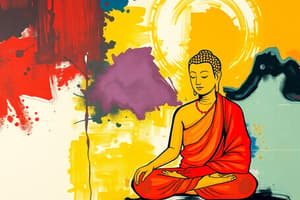Podcast
Questions and Answers
Which of the following best describes 'Dukkha' in the context of the Four Noble Truths?
Which of the following best describes 'Dukkha' in the context of the Four Noble Truths?
- The ultimate state of happiness and enlightenment.
- The path of meditation leading to inner peace.
- The principle of non-violence towards all living beings.
- The inherent suffering and unsatisfactoriness present in life. (correct)
According to the Four Noble Truths, what is the primary cause of suffering?
According to the Four Noble Truths, what is the primary cause of suffering?
- Lack of material possessions.
- Ignorance of religious teachings.
- Craving and attachment to desires. (correct)
- External forces such as natural disasters.
What does 'Nirodha' refer to within the framework of the Four Noble Truths?
What does 'Nirodha' refer to within the framework of the Four Noble Truths?
- The endless cycle of birth and rebirth.
- The cessation or ending of suffering. (correct)
- The practice of giving to others.
- The accumulation of good karma through virtuous actions.
Which of the following is the purpose of the Eightfold Path?
Which of the following is the purpose of the Eightfold Path?
What does 'Right Understanding' entail within the context of the Eightfold Path?
What does 'Right Understanding' entail within the context of the Eightfold Path?
Which aspect of the Eightfold Path focuses on ethical and responsible behavior, emphasizing actions that do not harm others?
Which aspect of the Eightfold Path focuses on ethical and responsible behavior, emphasizing actions that do not harm others?
What does 'Right Mindfulness' involve in the practice of the Eightfold Path?
What does 'Right Mindfulness' involve in the practice of the Eightfold Path?
How does 'Right Livelihood' relate to the concept of reducing suffering?
How does 'Right Livelihood' relate to the concept of reducing suffering?
What is the role of meditation in 'Right Concentration' within the Eightfold Path?
What is the role of meditation in 'Right Concentration' within the Eightfold Path?
The Eightfold Path is best described as:
The Eightfold Path is best described as:
How does the Buddhist perspective on a 'Creator God' differ from that of some other major religions?
How does the Buddhist perspective on a 'Creator God' differ from that of some other major religions?
In Buddhism, what is the primary focus of personal transformation and achieving peace?
In Buddhism, what is the primary focus of personal transformation and achieving peace?
Which of the following best represents the relationship between actions and outcomes in Buddhism?
Which of the following best represents the relationship between actions and outcomes in Buddhism?
How do Buddhists typically approach challenges and difficulties in life?
How do Buddhists typically approach challenges and difficulties in life?
What distinguishes the Buddhist approach to understanding the universe from some other belief systems?
What distinguishes the Buddhist approach to understanding the universe from some other belief systems?
Flashcards
The Truth of Suffering (Dukkha)
The Truth of Suffering (Dukkha)
The truth that everyone experiences suffering in life including physical and emotional pain.
The Truth of the Cause of Suffering (Samudaya)
The Truth of the Cause of Suffering (Samudaya)
The truth that suffering is caused by craving, desire and attachments.
The Truth of the End of Suffering (Nirodha)
The Truth of the End of Suffering (Nirodha)
The truth that suffering can end by letting go of cravings and desires.
The Truth of the Path (Magga)
The Truth of the Path (Magga)
Signup and view all the flashcards
Right Understanding
Right Understanding
Signup and view all the flashcards
Right Intent
Right Intent
Signup and view all the flashcards
Right Speech
Right Speech
Signup and view all the flashcards
Right Action
Right Action
Signup and view all the flashcards
Right Livelihood
Right Livelihood
Signup and view all the flashcards
Right Effort
Right Effort
Signup and view all the flashcards
Right Mindfulness
Right Mindfulness
Signup and view all the flashcards
Right Concentration
Right Concentration
Signup and view all the flashcards
Belief in a Creator God?
Belief in a Creator God?
Signup and view all the flashcards
Study Notes
- The Four Noble Truths explain suffering and the path to inner peace in Buddhism.
The Truth of Suffering (Dukkha)
- Everyone experiences suffering including physical pain, sadness, and dissatisfaction.
- Even enjoyable experiences can cause suffering because they are temporary.
The Truth of the Cause of Suffering (Samudaya)
- Suffering arises mainly from craving and desire which involves wanting things that cannot always bring happiness.
- Clinging to desires and attachments leads to disappointment, stress, and suffering.
The Truth of the End of Suffering (Nirodha)
- Suffering can end by letting go of cravings and desires.
- Ceasing to want things to be different allows one to find peace and happiness, known as Nirvana.
The Truth of the Path Leading to the End of Suffering (Magga)
- Reducing suffering is achieved by following the Eightfold Path.
- The Eightfold Path provides guidelines for living a meaningful life.
The Eightfold Path
-
The Eightfold Path is a guide for Buddhists to live in a way that diminishes suffering, each step emphasizes values to achieve enlightenment.
-
Right Understanding: Understand the Four Noble Truths and the true nature of life.
-
Right Intent: Cultivate good thoughts, kindness, and helpful intentions.
-
Right Speech: Speak truthfully and kindly, avoiding gossip, lies, and hurtful words.
-
Right Action: Behave ethically and responsibly, avoiding harm to others.
-
Right Livelihood: Earn a living without causing harm to others.
-
Right Effort: Work to improve one's mind by cultivating positive thoughts and letting go of negative ones.
-
Right Mindfulness: Be aware of thoughts, feelings, and surroundings, focusing on the present.
-
Right Concentration: Develop focus through meditation to calm the mind for clearer thinking and inner peace.
Belief in a Creator God
- Buddhism does not include a belief in a Creator God, unlike Judaism, Christianity, or Islam.
- Buddhists focus on self-understanding and understanding the world, emphasizing personal responsibility for actions.
- Change is possible through one's choices and practices, and the universe operates through natural laws, not a deity's will.
- Instead of prayer, Buddhists use meditation, kindness, and mindfulness to achieve enlightenment and peace.
Studying That Suits You
Use AI to generate personalized quizzes and flashcards to suit your learning preferences.



